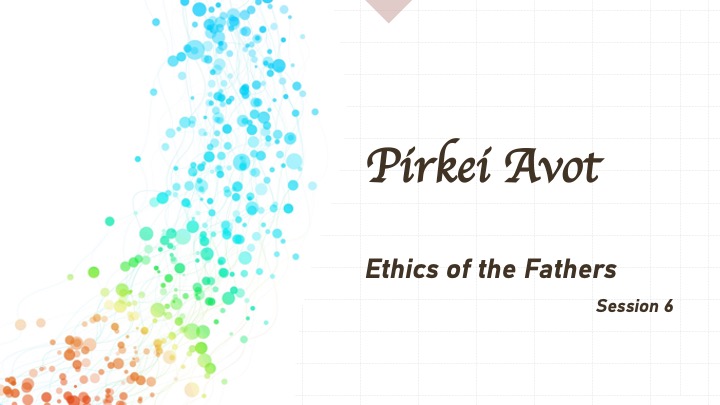Pirkei Avot Lesson 6
Sandy Kress

Ethics of the Fathers – Lesson Plan – Session Six
Introduction
II. Verses to Consider
A. Consider three things, and you will not come into the grip of sin: Know what is above you – a watchful Eye, an attentive Ear, and all your deeds are recorded in a Book. (Yehuda HaNasi) 2:1
Questions:
1. This wisdom is “sticky” for people of faith, that is to say, that it attaches to one’s mind, heart, and soul, and makes a big difference. Why might this be the case here?
a) What’s “above us?”
b) How are we seen and heard?
c) How are we recorded, and what difference does it make?
2. How then, like in the tale of the Sheep and the Goats in Matthew, does this wisdom make a difference in our lives and those of others, we hope?
B. Rabban Gamliel said: It’s good to combine Torah (Bible) study with a worldly occupation, for the effort involved in both makes one forget sin. Torah study without an occupation will cease in the end and lead to sin. 2:2
Questions:
1. First, what does our tradition teach about the importance of the Bible? Why and how is it important in our lives and to our community?
2. Why might it be important to match Bible study and work, rather than having either one without the other? First, let’s focus on what might be missing if we only or mostly have work?
3. What are the problems that arise if we only or mostly have Bible study?
C. Rabban Gamliel said: “All who are engaged in public service should exert themselves for the sake of Heaven, for then the merit of their ancestors will assist them, and their righteousness will endure forever. And you, the public servants, will be fully rewarded for your efforts, as though you had achieved it all. 2:2
Questions:
1. What’s the standard for determining the value/merit of public service? And, once citing it, define what it means.
2. How are public servants supported if they serve up to that standard? Explain how that works in more practical terms.
3. How does this wisdom offer comfort especially when the public servant may not feel like his/her service is making that big a difference?
III. Conclusion – What are the main takeaways from our study today?